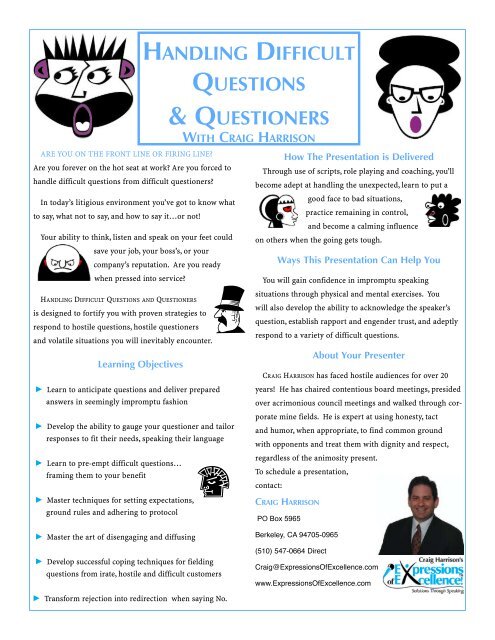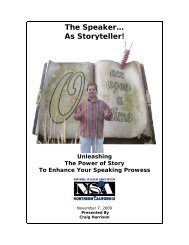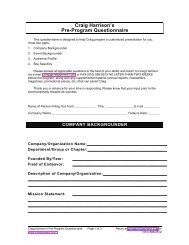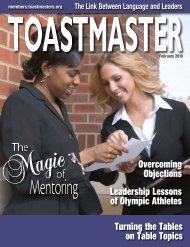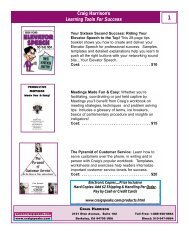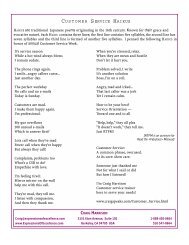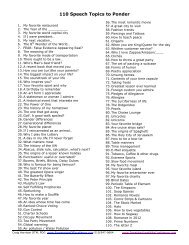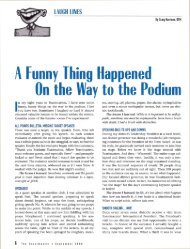Handling difficult Questions & Questioners - Craig Harrison's ...
Handling difficult Questions & Questioners - Craig Harrison's ...
Handling difficult Questions & Questioners - Craig Harrison's ...
Create successful ePaper yourself
Turn your PDF publications into a flip-book with our unique Google optimized e-Paper software.
Are You on the Front Line or FirinG Line?<br />
Are you forever on the hot seat at work? Are you forced to<br />
handle <strong>difficult</strong> questions from <strong>difficult</strong> questioners?<br />
in today’s litigious environment you’ve got to know what<br />
to say, what not to say, and how to say it…or not!<br />
Your ability to think, listen and speak on your feet could<br />
<strong>Handling</strong> <strong>difficult</strong><br />
save your job, your boss’s, or your<br />
company’s reputation. Are you ready<br />
when pressed into service?<br />
<strong>Handling</strong> <strong>difficult</strong> <strong>Questions</strong> and <strong>Questioners</strong><br />
is designed to fortify you with proven strategies to<br />
respond to hostile questions, hostile questioners<br />
and volatile situations you will inevitably encounter.<br />
Learning Objectives<br />
Learn to anticipate questions and deliver prepared<br />
answers in seemingly impromptu fashion<br />
Develop the ability to gauge your questioner and tailor<br />
responses to fit their needs, speaking their language<br />
Learn to pre-empt <strong>difficult</strong> questions…<br />
framing them to your benefit<br />
Master techniques for setting expectations,<br />
ground rules and adhering to protocol<br />
Master the art of disengaging and diffusing<br />
Develop successful coping techniques for fielding<br />
questions from irate, hostile and <strong>difficult</strong> customers<br />
transform rejection into redirection when saying no.<br />
<strong>Questions</strong><br />
& <strong>Questioners</strong><br />
WitH craig Harrison<br />
How The Presentation is Delivered<br />
through use of scripts, role playing and coaching, you’ll<br />
become adept at handling the unexpected, learn to put a<br />
good face to bad situations,<br />
practice remaining in control,<br />
and become a calming influence<br />
on others when the going gets tough.<br />
Ways This Presentation Can Help You<br />
You will gain confidence in impromptu speaking<br />
situations through physical and mental exercises. You<br />
will also develop the ability to acknowledge the speaker’s<br />
question, establish rapport and engender trust, and adeptly<br />
respond to a variety of <strong>difficult</strong> questions.<br />
About Your Presenter<br />
craig Harrison has faced hostile audiences for over 20<br />
years! he has chaired contentious board meetings, presided<br />
over acrimonious council meetings and walked through corporate<br />
mine fields. he is expert at using honesty, tact<br />
and humor, when appropriate, to find common ground<br />
with opponents and treat them with dignity and respect,<br />
regardless of the animosity present.<br />
to schedule a presentation,<br />
contact:<br />
craig Harrison<br />
PO Box 5965<br />
Berkeley, CA 94705-0965<br />
(510) 547-0664 Direct<br />
<strong>Craig</strong>@ExpressionsOfExcellence.com<br />
www.ExpressionsOfExcellence.com
Hecklers, Hardliners, and Heavy <strong>Questions</strong><br />
<strong>Handling</strong> Difficult <strong>Questions</strong> and <strong>Questioners</strong><br />
with Facility and Ease<br />
By <strong>Craig</strong> Harrison<br />
Does your job place you on the front line or firing line where you are forced to<br />
handle <strong>difficult</strong> questions from <strong>difficult</strong> questioners?<br />
In today’s litigious environment you’ve got to know what to say, what not to say,<br />
and how to say it…or not! Your ability to think, listen and speak on your feet could save<br />
your job, your boss’s, or your company’s reputation.<br />
Whether you're in investor relations, customer service or technical support you're<br />
often expected to dance through verbal minefields. Say the wrong thing and you may<br />
never recover from the damage. But how does one know what to say, what not to say,<br />
and how to avoid escalating hostilities when the going gets tough?<br />
With mental and physical preparation you can handle the most <strong>difficult</strong> questions<br />
and questioners with ease and eloquence. Understanding some basic strategies can help<br />
you think on your feet, speak on your feet, and avoid putting your feet into your mouth.<br />
By understanding your responsibilities and options you'll be better able to handle <strong>difficult</strong><br />
questions and <strong>difficult</strong> questioners with deftness.<br />
Physical Strategies<br />
Situations abound when we're forced into impromptu speaking situations. Just<br />
because you’re speaking extemporaneously doesn’t mean you can’t prepare yourself.<br />
Here are some basic physical tips to employ when you speak “off the cuff” in business<br />
situations:<br />
Breathe:<br />
Oftentimes when we feel pressure we tighten up. Breathing brings vital oxygen to the<br />
brain, and calms you and your body, and also relaxes your voice and your vocal chords.<br />
Smile:<br />
When you smile you loosen your jaw, reassure yourself and also relax your audience,<br />
predisposing them to receive you better and letting them know you’re in control and<br />
confident. You shouldn't smirk or laugh, since you want and need to be taken seriously.<br />
Yet tensing up and furrowing your brow will only induce more tension.<br />
Think:<br />
Think before speaking. There’s often a tendency to speak first…DON’T! Collect<br />
yourself and your thoughts. You’re entitled to reflect before to speaking. Don’t shoot<br />
from the hip. Take careful aim before speaking. We're conditioned to avoid silence at all<br />
costs, yet skilled negotiators know of the value of a pregnant pause. It's prudent to pause,<br />
underlying the care with which you're weighing the question and your response. It's a
sign of respect that you pause to consider the question, even if you know the answer and<br />
have given it many times before.<br />
Eye Contact:<br />
Eye contact helps your persuasiveness and ability to engage an audience, whether one or<br />
many. Use it to lock in different parts of the room, or to address the questioner directly.<br />
In our society looking someone in the eye reinforces our honesty and sincerity. It's a sign<br />
of respect which can help diffuse mistrust or distrust.<br />
Exude Confidence:<br />
This is done through body language, your delivery, posture, assuredness. Take control of<br />
the situation. Speak with authority. Deliver your message calmly and thoughtfully.<br />
Speak in measured sentences.<br />
Strong Opening Statement:<br />
The best way to establish yourself as an authority or knowledgeable about your topic is to<br />
begin from a position of strength. It’s your one chance to make your first impression.<br />
Structure:<br />
Don’t be over-ambitious. Make two or three points only. Enumerate them if possible.<br />
Just as in a prepared speech, offer an opening-body-conclusion structure. Give your<br />
overview, make your key points, and summarize.<br />
E-A-R<br />
Empathize with the questioner, Acknowledge their point, and only then Respond to it.<br />
This lets them know they were heard and understood.<br />
Stop!<br />
Know when to stop. Be succinct. Better to say too little then say too much!<br />
Mental Strategies<br />
It is a given you at times you will encounter tough questions, tough questioners<br />
and hostile audiences. Your responses can either disarm or antagonize them, depending<br />
on your preparation, coolness under pressure, and understanding of human dynamics.<br />
Here are some mental strategies to employ when faced with <strong>difficult</strong> questions or<br />
questioners.<br />
Gauge Your Audience Prior To & During Your Presentation<br />
Know their educational level, disposition, political orientation, etc. Monitor their<br />
reactions to others. Are they restless, antagonistic, confused, angry? Put yourself in the<br />
shoes of the questioner: are they fearful, pained, feeling taken advantage of, ill-informed<br />
or misinformed? Consider their motivation in asking their question. That will help you<br />
understand what will soothe, salve or satisfy the questioner.
Anticipate <strong>Questions</strong><br />
Prepare answers for the questions you may encounter. Spend time anticipating the most<br />
likely or troubling questions and fashion your response ahead of time.<br />
It's OK to pause before delivering a prepared response in impromptu fashion. Don't rush<br />
to respond.<br />
Diffuse Hostile <strong>Questions</strong> By Answering Them Before They’re Asked!<br />
Disarm your opponents by anticipating and answering their questions in your own<br />
remarks before they pose them to you. You’ve just taken the wind out of their sails.<br />
You've quelled their fire, and appeased them prior to their challenging you. Then, if a<br />
hostile question persists, you can refer them back to your previous remarks, or inform<br />
them theit question has already been answered, and move on to new questions.<br />
Set Expectations, Ground Rules and Protocol<br />
You can announce that questions will be taken at the end, that they must be submitted in<br />
writing, or that they must pertain to a certain subset of topics. You can also defer some<br />
questions smoothly if you pre-announce your limited expertise in certain areas. When<br />
challenging questions on those topics ensue, remind them those are outside the scope of<br />
your expertise…but that someone appropriate can respond to them (later). Defer to<br />
experts on your team. DO NOT speak out of your area of expertise. You will lose points<br />
and credibility. Instead, gain points by knowing your limitations and not speaking<br />
beyond them.<br />
Restate the Question to Your Liking<br />
Their question may be problematic, a two-part question, or one that leads you down a<br />
path you don’t want to go. Put your best spin on it by modifying it when you restate it,<br />
removing charged language, then answering with the message you wish to share.<br />
Turn the Tables<br />
You can answer hostile questions with your own questions such as: Why do you ask?<br />
Please identify yourself, your company, qualifications and reason for asking?<br />
Alternately, you can ask, "what do you mean by that?"<br />
Avoid Escalating Hostilities<br />
Try to either empathize with the questioner or find some common ground. In a group<br />
situation you will appear to be more sympathetic and a hostile questioner will appear to<br />
be the problematic one.<br />
Don’t Take it Personally…and Don’t Tolerate Personal Attacks<br />
Separate the message from the messenger. Don’t take it personally even if the question<br />
hits close to home. But, recognize that ad hominid attacks (attacks against your person)<br />
are deemed out of bounds. Label them as such and refuse to tolerate them. Stick to the<br />
facts and insist that personalities be ignored.
With practice comes confidence. Consider joining a Toastmasters club or other<br />
organization which gives you experience speaking extemporaneously in low-stakes<br />
situations. There you can try out different techniques and observe others' speaking styles.<br />
###<br />
<strong>Craig</strong> Harrison is a professional speaker, corporate trainer and communication coach who<br />
helps others communicate with confidence and clarity. To book <strong>Craig</strong> for a speaking<br />
engagement contact him through his website: www.ExpressionsOfExcellence.com,<br />
e-mail him at <strong>Craig</strong>@ExpressionsOfExcellence.com or call (510) 547-0664.


